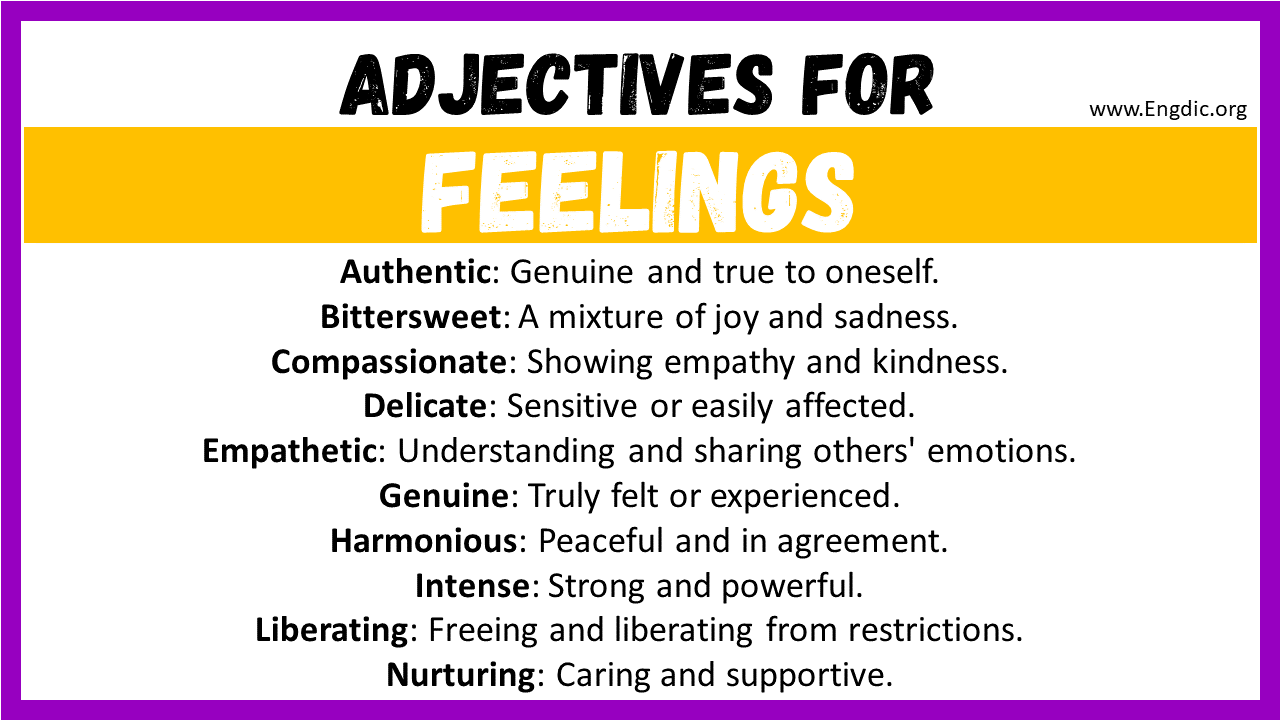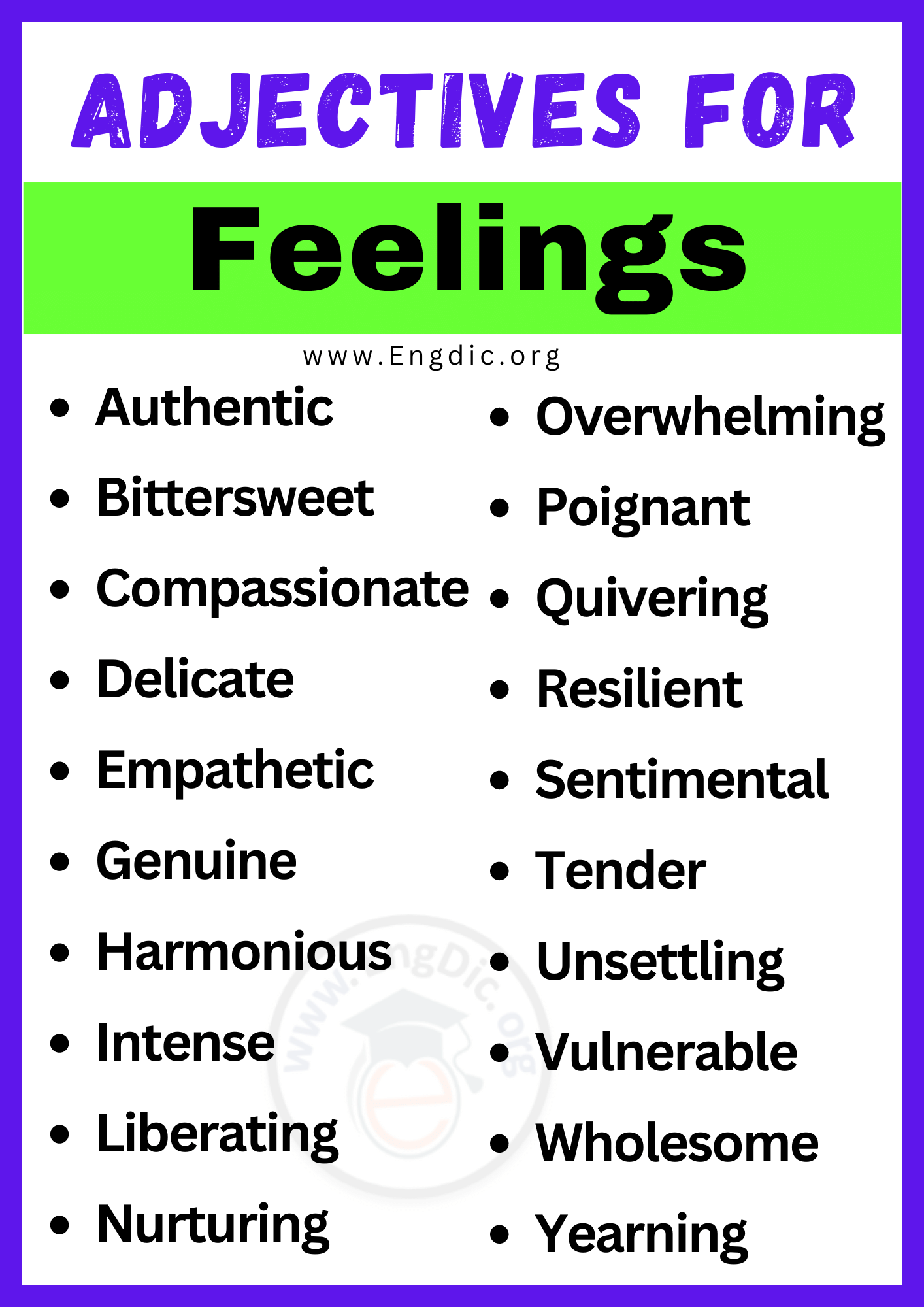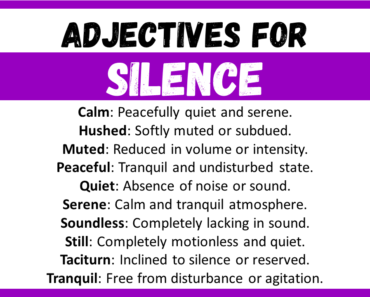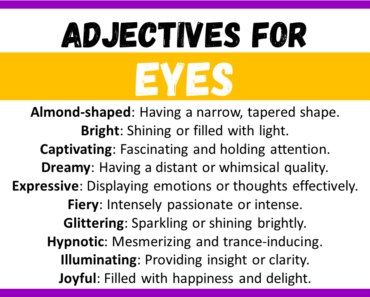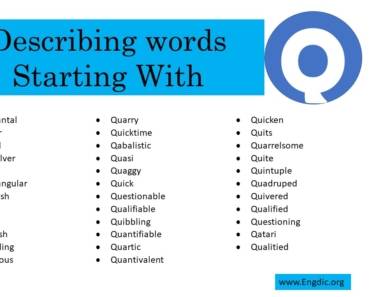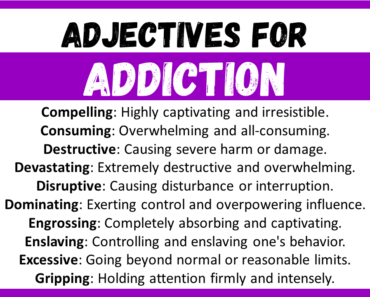Feelings, those elusive yet powerful sensations that color our daily experiences, have always been an integral part of human existence. They are the emotional responses that guide our actions, shape our relationships, and influence our well-being. And when it comes to expressing these intricate states of being, words become our trusted allies. In this blog post, we delve into the world of words to describe feelings. From joy and sadness to excitement and fear, we explore a rich tapestry of vocabulary that allows us to articulate the depths of our emotions with clarity and precision.
Adjectives for Feelings
Here are the 20 Most Popular adjectives for feelings:
- Authentic
- Bittersweet
- Compassionate
- Delicate
- Empathetic
- Genuine
- Harmonious
- Intense
- Liberating
- Nurturing
- Overwhelming
- Poignant
- Quivering
- Resilient
- Sentimental
- Tender
- Unsettling
- Vulnerable
- Wholesome
- Yearning
Adjectives for feeling good:
- Happy
- Content
- Blissful
- Ecstatic
- Delighted
- Satisfied
- Elated
- Joyful
- Radiant
- Grateful
Adjectives for feeling bad:
- Unhappy
- Upset
- Distressed
- Miserable
- Depressed
- Frustrated
- Angry
- Anxious
- Worried
- Disappointed
Adjectives for feeling sad:
- Melancholy
- Grief-stricken
- Heartbroken
- Despondent
- Blue
- Tearful
- Sorrowful
- Dejected
- Gloomy
- Depressed
Adjectives for feeling love:
- Affectionate
- Passionate
- Devoted
- Adoring
- Tender
- Enamored
- Infatuated
- Smitten
- Amorous
- Besotted
Words to Describe Feelings with Meanings
- Authentic: Genuine and true to oneself.
- Bittersweet: A mixture of joy and sadness.
- Compassionate: Showing empathy and kindness.
- Delicate: Sensitive or easily affected.
- Empathetic: Understanding and sharing others’ emotions.
- Genuine: Truly felt or experienced.
- Harmonious: Peaceful and in agreement.
- Intense: Strong and powerful.
- Liberating: Freeing and liberating from restrictions.
- Nurturing: Caring and supportive.
- Overwhelming: Powerful and all-consuming.
- Poignant: Evoking deep emotions or sadness.
- Quivering: Trembling or shaking with emotion.
- Resilient: Able to bounce back from adversity.
- Sentimental: Evoking feelings of nostalgia or sentiment.
- Tender: Gentle and affectionate.
- Unsettling: Disturbing or causing unease.
- Vulnerable: Open to emotional harm or pain.
- Wholesome: Positive and nourishing.
- Yearning: Longing or strong desire.
Example Sentences for Feelings Adjectives
- The authentic smile on her face spoke volumes.
- The ending of the movie was bittersweet and emotional.
- He showed a compassionate response to their plight.
- Handle fragile items with delicate
- Her empathetic nature made her a great counselor.
- His genuine concern for others was evident.
- The choir’s performance was harmonious and beautiful.
- The storm unleashed an intense fury upon the town.
- Traveling alone was a liberating experience for her.
- The nurturing environment at the daycare helped the children thrive.
- The crowd’s response was overwhelming and heartfelt.
- The old photograph brought back poignant
- Her voice quivered with emotional intensity as she spoke.
- Despite the challenges, he remained resilient and never gave up.
- The sentimental gift brought tears to her eyes.
- He showed tender affection towards his newborn baby.
- The eerie silence was unsettling in the abandoned house.
- Opening up about his fears made him feel vulnerable.
- The wholesome meal left them feeling nourished and satisfied.
- She couldn’t ignore the yearning in her heart for adventure.
Explore More Words:
Words to Describe Appreciation
FAQ’s
How to describe feelings in writing?
Describing feelings in writing involves using vivid language, sensory details, and expressive adjectives to convey emotions effectively and engage the reader in an empathetic experience.
What expresses a strong feeling?
Strong feelings can be expressed through various means, such as passionate words, intense body language, emotional outbursts, or impactful actions that reflect the depth and intensity of the emotions being experienced.
